
|
Sale 86
The Manuscripts, Collectibles & Space Auction
| The William K. Steiner Collection - Foreign Statesmen |
| |
| |
| Lot |
Photo |
Description |
Realized |
Lot 236 |
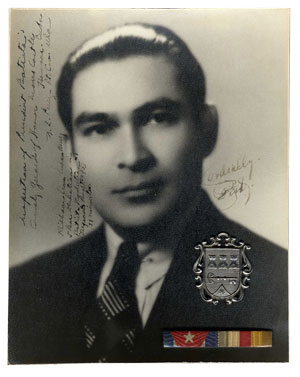 |
Batista, Fulgencio (1901-1973) President of Cuba (1940-1944), and dictator (1952-1959); he was overthrown by Fidel Castro. Photograph signed and inscribed "Cordially," 9½ x 7½ in. (Havana, c. 1940-44). A head-and-shoulders portrait; attached to the photo is a military ribbon and a crest. Also, two notations by an American soldier: "Inspection of President Batista's Cavaly Guard of Honor Morro Castle Havana - Cuba N.L. Fesy - Lt. Col. USA…".
Estimated Value $400 - 600.
View details and enlarged photo
| Realized
$750 |
Lot 237 |
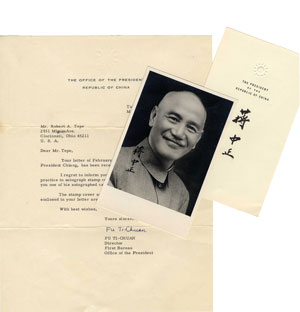 |
Chiang Kai-shek (1887-1975) Leader of the Republic of China between 1928 and 1975. Two signed items: a 5¾ x 3¾ in. chest-up photo signed in Chinese characters on Chiang's right shoulder; with a 6½ x 3¾ card signed by Chiang in Chinese character under his printed title "The President of the Republic of China." Accompanied by a letter from the Office of the President, stating that the President does not sign stamp covers but he is sending an autographed card. With two envelopes from the President's Office, Taipei, Taiwan, bearing Chinese stamps.
Estimated Value $400 - 600.
View details and enlarged photo
| Realized
$1,219 |
Lot 238 |
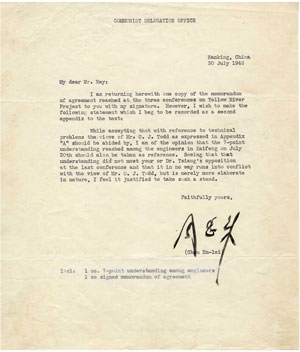 |
Chou En-Lai (1898-1976) First Premier of the People's Republic of China (1949-76); skilled diplomat who met with Henry Kissinger and was instrumental in Nixon's visit to China in 1972. Typed letter signed in Chinese, 1 page, on Communist Delegation Office letterhead, in English, 9½ x 8¼ in., Nanking, China, July 30, 1946. To Mr. Ray, a member of the Marshall Mission, stating that he is "returning herewith one copy of the memorandum of agreement [not present] reached at the three conferences on Yellow River Project to you with my signature….While accepting that with reference to technical problems the views of Mr. O.J. Todd should be abided by…I am of the opinion that the 7-point understanding reached among the engineers in Kaifeng…should also be taken as reference. …"
The Marshall Mission was a failed diplomatic attempt by the U.S. Government after World War II to negotiate a unity government between the Chinese Communists (CCP) and the Chinese Nationalists (KMT). The hope was that a non-Communist China would serve as a bulwark against the Soviet Union. In December 1945, President Truman appointed General George C. Marshall as his special envoy to China. Marshall was charged with brokering a ceasefire between the warring CCP and KMT. Chou represented the Communists and the outlook, at first optimistic, deteriorated as neither the CCP nor the KMT were willing to make concessions. On October 9, 1946 Chou informed Marshall that he (Chou) no longer had the confidence of the CCP. The civil war intensified and in February, 1947, Marshall returned to the U.S. and devoted his energies to the revitalization of Europe (The Marshall Plan).
Estimated Value $400 - 600.
View details and enlarged photo
| Realized
$41,250 |
Lot 239 |
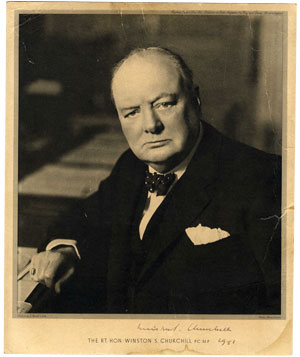 |
Churchill, Winston S. Photograph signed ("Winston S. Churchill / 1941"), as wartime Prime Minister of the United Kingdom, 9 3/8 x 7¾ in. With title, "The Rt. Hon. Winston S. Churchill P.C. M.P." A seated, waist-up portrait by J. Russell & Sons, Baker Street, London. Toned; small dampstain at lower edge; several cracks and creases, but still a wonderful portrait.
Estimated Value $900 - 1,200.
View details and enlarged photo
| Realized
$2,313 |
Lot 240 |
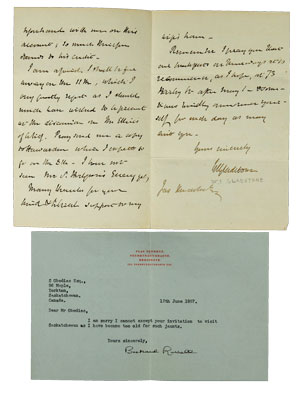 |
Gladstone, William and Betrand Russell. Autograph letter signed ("W.E. Gladstone"), 3 pages, 7¼ x 4 5/8 in., 4 Carleton Gardens S.W., Mar. 29, 1876. To James Knowles, Esq., acknowledging a receipt and detailing why the payment was too much and regretting that he will be "far away on the 11th" and cannot be present at a discussion. He begs to have a copy sent to him and invites Mr. Knowles to breakfast with him on Wednesday. Gladstone served as British Prime Minister four separate times: (1868-74, 1880-85, February-July 1886 and 1892-94). Sir James Knowles (1831-1908) was an architect and the editor of Contemporary Review. Housed in a custom-made case. Together with a typed letter signed by British philosopher, logician, social reformer and winner of the 1950 Nobel Pize for Literature, Bertrand Russell (1872-1970), 1 page, 5 x 8 in. on personal engraved letterhead, Penrhyndeudraeth, Merioneth, Wales, June 13, 1957. To S. Obodiac in Saskatchewan, Canada, regretting that he cannot accept an invitation to visit: "…I have become too old for such jaunts." With transmittal envelope.
Estimated Value $200 - 250.
View details and enlarged photo
| Realized
$263 |
Lot 241 |
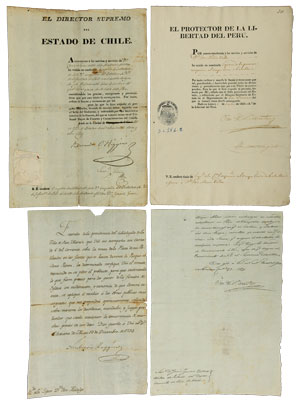 |
[Latin American Liberators] Bernardo O'Higgins & José de San Martín. Group of two documents and two letters: Bernardo O'Higgins (1778-1842) Chilean independence leader who freed Chile from Spanish rule in the Chilean War of Independence. O'Higgins was the first Supreme Director of Chile (1817-23). Partly-printed document, accomplished in manuscript and signed as Supreme Director of the State of Chile, 1 page, 12¼ x 8½ in., Talca, Feb. 13, 1818. Toning, small stains, and some repairs to folds on verso; a few small holes affect three words of text. Appointing a military cadet, Ignacio Gana, to a position in the infantry. With an extremely rare letter signed by Ambrosio Higgins, father of Bernardo Higgins, 1 page, Chacara de Mata, December 13, 1794. To José Hidalgo, discussing Easter festivities and public disorder in the Villa de San Martín. Ambrosio (1720-1801) was an Irish-born Spanish colonial administrator. He served the Spanish Empire as military governor of Chile (1788-1796) and viceroy of Peru (1796-1801).
José de San Martín (1778-1850) Argentine soldier, statesman, and national hero who helped lead the revolutions against Spanish rule in Argentina (1812), Chile (1818), and Peru (1821). Letter signed, 1 page, 11¾ x 8¼ in., Huarra, Jan. 28, 1821. To José Ignacio Zenteno, Chilean Minister of State, reporting the latest information on Spanish army movements, recommending troop deployments, and expressing his overall optimism: "I do not doubt…the influence of a favorable feeling in public sentiment, and increasing patriotism." In July of 1821, San Martín's army entered Lima and proclaimed Peru's independence. Together with a partly-printed document, accomplished in manuscript and signed as "Protector of the Liberty of Peru," 1 page, 12¼ x 8½ in., Lima, Oct. 6, 1821. Promoting José Maxia Valdes to the 1st Company of Cavalry.
Estimated Value $2,000 - 3,000.
View details and enlarged photo
| Realized
$2,460 |
Lot 242 |
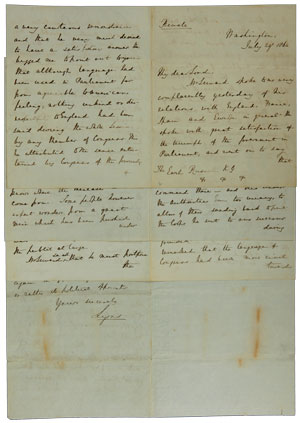 |
Lyons, Richard, 1st Viscount Lyons (1817-1887) British diplomat; Ambassador to the United States (1858-1865). Autograph letter signed ("Lyons"), 13½ pages, 9½ x 7½ in, Washington, July 29, 1864. To John Russell, 1st Earl Russell, who was British Foreign Secretary (1859-1865). Marked "Private." In part: "Mr. Seward spoke to me very complacently yesterday of his relations with England, France, Spain and Europe in gerneral….[He] went on to say that there were only two matters which he thought might cause 'trouble' - The first was the interference of the 'Deerhound' with the capture of Captain Semmes and the crew of the 'Alabama' - Mr. Seward did not appear to me to think himself that this constituted any real grievance, but he said that it was a matter which touched popular feeling - and that therefore he was very anxious that in answer to the representations which would be made, something as civil and conciliatory as possible should be written by Her Majesty's government - something which would help to set him right with the American People, when the correspondence was published. the other point which he thought might be troublesome was the stay that the [British warship] 'Florida' was reported to have made at Bermuda before her last expedition….All is now supposed to depend upon Sherman's Army before Atalanta [sic]. It seems to be admitted that Grant can do nothing without a large increase of force - and no one knows where the increase is to come from." He mentions "a great mine which has been pushed under one of the principal Confederate works before Peterburgh, and which is…to be exploded next week….it seems very doubtful whether it will produce any great result….the Confederates keep a force at the head of the Shenandoah Valley…and this renders the authorities here to uneasy….I could not take quite so complacent a view as Mr. Seward did of the relations between England and the United States. Grievances on our side seem to me to be accumulating. Perhaps I attach too much importance to the cases of imprisonment, interference with trade, and wrong of all kinds, whare are the labour of my life….He spoke as if he was looking for great successes, which give the Administration so much strength, that they need not fear that a settlement of the San Juan question would be misinterpreted….He was perhaps…apprehensive than an unsuccessful Campaign would weaken the Administration towards England and less Civil towards France than usual….the success of any policy in America, is that England and France should be looked on as nearly as possible as identical…I sounded Mr. Seward about the Reciprocity Treaty, and he seemed to think the wise course would be to let it alone…." Lyons says that he asked Seward if the "San Juan question" could be referred to arbitration and adds that if there were not a fair chance that a two thirds majority of the Senate would vote to establish an equitable boundary line, it was best to avoid the issue for the moment. He disagrees with Mr. Seward that the Congress had used no unfriendly language toward England, but he couldn't think of any examples to prove his point. "The best sign I see is that as the Election approaches, the arbitrary military measures at New York and other great places seem to be relaxed. A great military success in the field would no doubt enable the government to show vigour again in oppressing its enemies, or rather its political enemies." In December of 1864, Lyons left Washington, suffering from nervous exhaustion and migraines, and in the spring of 1865, he resigned his post, citing poor health. He had acquitted himself well during a most stressful time.
Estimated Value $2,000 - 3,000.
View details and enlarged photo
| Realized
$1,170 |
Lot 243 |
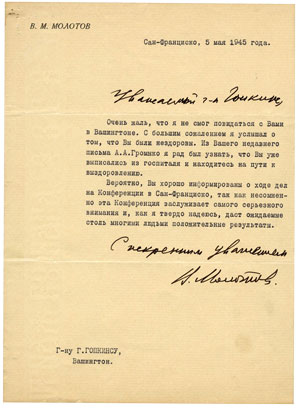 |
Molotov, Vyacheslav (1890-1986) Soviet politician and diplomat; he was the principal signatory on the Molotov-Ribbentrop Pact in 1939. Typed letter signed ('V. Molotov") as Minister of Foreign Affairs and First Deputy Premier, 1 page, in Russian, 9¾ x 7 7/8 in., San Francisco, May 5, 1945.With holograph greeting and closing. To Harry Hopkins, close adviser to FDR and one of the architects of the New Deal. With Department of State translation. "I deeply regret that I was not able to see you in Washington. I was very sorry to learn that you have been ill. From your recent letter to Mr. A. A. Gromyko I was pleased to learn that you have already been discharged from the hospital and are on the road to recovery. You are probably well informed about the course of events at the Conference in San Francisco, for undoubtedly this Conference merits the most serious attention and, as I firmly hope, it will produce the positive results desired by so many people."
In 1945, representatives of 50 countries met in San Francisco at the United Nations Conference on International Organization to draw up the United Nations Charter. The Charter was signed on June 26, 1945 by representatives of the 50 countries. Poland signed later and became the 51st Member State. The United Nations officially came into existence on October 24, 1945 after the Charter was ratified by China, France, the Soviet Union, the United Kingdom, the United States, and a majority of other signatories. Truly a momentous occasion whose importance Mr. Molotove recognized.
Estimated Value $2,000 - 3,000.
View details and enlarged photo
| Realized
$1,438 |
Lot 244 |
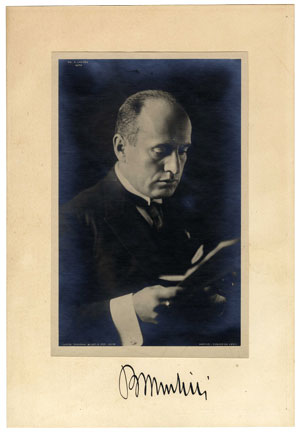 |
Mussolini, Benito (1883-1945) Fascist dictator of Italy from 1922-1943; known as "Il Duce." Sepia-toned photograph signed ("B Musolini") on the mount to which the 9 x 5 3/4 in. photo is affixed at top. A waist-up portrait by V. Laviosa, Rome. With a 1926 letter from the Italian Consular Agent in Rome to Mr. Carleton Potter Small in Portland, Maine, saying the autographed photo is being sent to him "in acknowledgment of your good feelings and as a prize of your constant propaganda intending for a better reciprocal understandng between the Americans and the Italians."
Estimated Value $300 - 500.
View details and enlarged photo
| Realized
$656 |
Lot 245 |
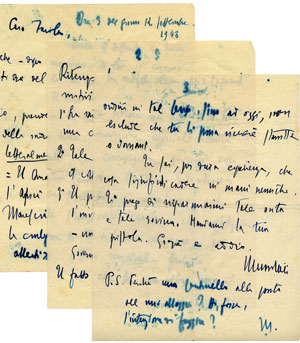 |
Mussolini, Benito. Autograph letter signed ("Mussolini") with postscript initialed ("M"), 3 pages, September 12, 1943. Written from Campo Imperatore Hotel, a ski resort at Campo Imperatore in Italy's Gran Sasso massif, in the Apennine Mountains, to "Dear Faiola," (his jailer), asking him to procure a pistol so that Mussolini can take his own life. Smudged at top and bottom of all three pages. Written earlier on the same day that German paratroopers would rescue him in a daring mission called Operation Eiche (German for "oak").
On the night of July 24, 1943, the Italian Grand Council of Fascism voted a motion of no confidence (Ordine del Giorno Grandi) against Mussolini and the king appointed Marshal Pietro Badoglio as prime minister in Mussolini's place. Mussolini was held prisoner on small islands in the Tyrrhenian sea, then moved to his Gran Sasso prison, where he was guarded by 200 Carabinieri.
Hitler personally selected Otto Skorzeny to head the rescue of Mussolini, and on September 12, in a high-risk glider mission, German commandos landed their DFS 230 gliders on the mountain and took Mussolini without firing a shot.
On April 27, 1945, partisans captured Mussolini and his mistress, Clara Petucci, as they tried to escape to Switzerland. They were summarily executed and their bodies were taken to a piazza in Milan (where partisans had been hanged by the Fascists) and were hung upside down on meat hooks so that passers-by could spit on them and stone them. The message was clear to any Fascists who might think about continuing the fight.
Estimated Value $2,000 - 3,000.
Christie's New York, June 9, 2004, lot 400.
View details and enlarged photo
| Realized
$5,040 |
Lot 246 |
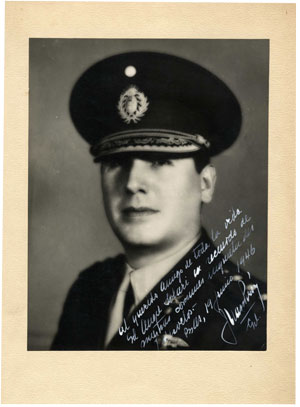 |
Perón, Juan (1895-1974) Military officer and three-time President of Argentina (1946-1955 and 1973 until his death in July 1974). Photograph signed ("Juan Perón) two weeks after being elected president of Argentina for the first time, 10¾ x 7 7/8 in., June 10, 1946. To his "lifelong dear friend Angel Selari…."
Estimated Value $250 - 300.
View details and enlarged photo
| Realized
$275 |
Lot 247 |
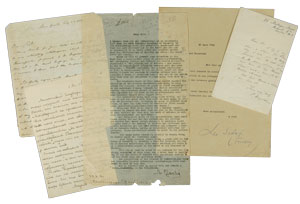 |
[Russia] Gorky, Trotsky, Krapotkin, Prince Frederick, and Others. Leon Trotsky letter signed "Leo Sedoff (Trotsky)," 1 page, in French, 11 x 8½ in., no place, March 21, 1935. While living in France after his return from exile in Prinkipo, Trotsky writes to his lawyer, Maitre Gerard Rosenthal, urging him to continue to oversee the publication of his works and to defend his interests generally, adding that he looks forward to a meeting when they can continue their discussions on these issues.
Maxim Gorky (1868-1936) typed letter signed ("M. Gorky") 1 page, onion skin paper, 13 x 8 in., no place, Oct. 28, 1921 (28.X. 21 is written at lower left). To "Dear Sirs" saying "the most valuable treasure of humanity is its intellectual force, its scientific experiment…and the most precious men in the world are the men of science…." He calls attention to the desperate plight of Russian scientists who are literally dying of hunger because the Soviet Government has no money and cannot pay them for their work. He pleads for flour, grain, beans, fats and sugar and asks for help in printing the works of Russian scientists, since there is no paper or technical means in Russia. "America would bring a great gift to the cause of humanity….For you, citizen of the richest of countries who know how to execute immense industrial undertakings,--this task should be such an easy one…." Numerous penciled notes and several chips.
Peter Kropotkin (1842-1921) typed letter signed ("P. Kropotkin"), 1 page, 7 x 4½ in., London, no date. To an unidentified recipient, giving an address to which a check should be forwarded, "I am now here for my 'Recent-Science' work, never to the British Museum…." Mounting remnants on verso.
Two autograph letters signed by James Smirmov, chaplain to the Russian Embassy in London, dated 1821 and 1822, one to Thomas Dimsdale, returning a Russian silver piece (not present) with information. The second is to Joseph Dimsdale, son of physician Thomas Dimsdale (1712-1800), who had successfully innoculated Catherine the Great, her son Grand Duke Paul and over 140 members of her Court in 1768, asking for "a respectable connexion…with a view of being supplied in Russia with Druggs as necessary for carrying on their Professional objects" for some of his countrymen.
Maria Tolstoy, daughter of Leo Tolstoy, an 1890 ALS, in Russian, 1 page, 8½ x 5¼ in., to his French translator, Halpérine-Kaminsky, regarding the composition of an article on her father's views, advising him to use certain works, and saying that The Fruits of Enlightenment will be published soon. (6 letters, total of 7 pages)
Together with an ALS by Prince Frederick ("Frederick"), Duke of York and Albany, 1½ pages, July 23, 1807, thanking his correspondent for interesting intelligence about Napoleon's proposal to the Emperor of Russia and saying he agrees with His Majesty (George III). The British bombarded Copenhagen (Aug. 16-Sept. 5, 1807) in order to seize the Dano-Norwegian fleet and make sure it didn't fall into French hands. The incident led to the outbreak of the Anglo-Russian War of 1807.
Estimated Value $1,500 - 2,500.
View details and enlarged photo
| Realized
$4,680 |
Lot 248 |
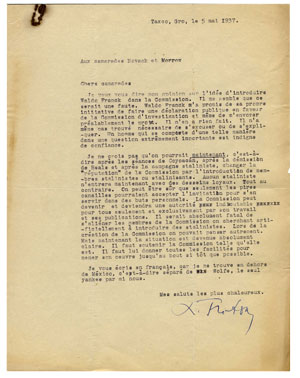 |
Trotsky, Leon (1879-1940) Bolshevik revolutionary and Marxist theorist; in the early days of the Soviet Union he was People's Commissar for Foreign Affairs, then founder and commander of the Red Army and People's Commissar of War. After Lenin's death, Trotsky was defeated in a struggle with Stalin for control of the Communist Party; he was expelled from the party and deported from Russia. He lived in exile in Mexico, where he was assassinated by a Soviet agent.
Typed letter signed ("L. Trotsky"), 1 page, in French, 10 7/8 x 8 3/8 in., Taxco, Gro, May 5, 1937. To comrades (George) Novack and (Felix) Morrow. He writes that he thinks it would be a mistake to admit Waldo Franck to the Commission (of Inquiry of The American Committee for the Defense of Leon Trotsky). Franck had made Trotsky a promise to make a public statement in favor of the Commission of Inquiry but he had done nothing and had not even found it necessary to make an excuse or to explain himself. "A man who acts in such a manner is not worthy of confidence. I do not believe that one could now, that is to say after the Coyoacán meetings, after the resignation of Beals and after the Stalinist campaign, change the 'reputation' of the Commission by the introduction of Stalinist or 'Stalinistic' [stalinisants] members. No Stalinist with loyal intentions will join now. To the contrary. One can be sure that only the worst rabble would be able to accept the invitation…The Commission can become and will become an indiputable authority for everyone solely and exclusively by its work and publications. It would be absolutely fatal to alienate the members of the Commission by seeking artificially to introduce Stalinists. When the Commission was created, it was possible to think otherwise. But now the situation has become completely clear. We have to maintain the Commission as it is. We have to give it every opportunity to lead its work to a conclusion as soon as possible." Trotsky explains that he is writing in French because he finds himself outside of Mexico, separated from Wolfe, "the only Yankee among us." Bernard Wolfe was Trotsky's secretary while Trotsky was in Mexico. George Novack was secretary of the American Committee for the Defense of Leon Trotsky. Felix Morrow was a leading figure figure in American Trotskyism.
In May 1937, the Commission of Inquiry into the Charges Made against Leon Trotsky in the Moscow Trials, commonly known as the Dewey Commission, was set up in the United States by supporters of Trotsky, to establish the truth about the trials. The commission was headed by the noted American philosopher and educator John Dewey. Although the hearings were obviously conducted with a view to proving Trotsky's innocence, they brought to light evidence which established that some of the specific charges made at the trials could not be true. The Dewey Commission later published its findings in a 422-page book titled Not Guilty. Letter is toned,with a split rust mark from a paper clip, and normal folds.
Estimated Value $2,500 - 3,500.
View details and enlarged photo
| Realized
$2,760 |
Lot 249 |
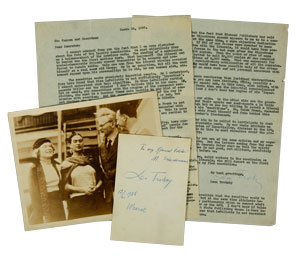 |
Trotsky, Leon. Typed letter signed, 2 pages, in English, on onion skin paper, 11 x 8½ in., no place (Mexico), Mar. 29, 1937. To American Trotskyists James Cannon and Max Schachtman, regarding the inquiry commission ("Commission of Inquiry into the Charges Made against Leon Trotsky in the Moscow Trials") which was initiated in March 1937 by the American Committee for the Defense of Leon Trotsky and headed by John Dewey. Its other members were Carleton Beals, Otto Ruehle, Benjamin Stolberg, Alfred Rosmer, Wendelin Thomas, Edward A. Ross, John Chamberlain, Carlo Tresca, Francisco Zamora and Secretary Suzanne La Follette.
Trotsky writes, in part: " I cannot conceal from you the fact that I am very disturbed about the fate of the inquiry commission….The liberal and social-democratic friends showed themselves to be cowards….Only one man from the liberal circles revealed himself as a real man - old Dewey….but all the work cannot depend upon his personality: he is old, he can become sick, etc. The committee seeks absolutely impartial people….they have found that Miss LaFollette is not sufficiently 'impartial'. I cannot understand what this signifies. Is Miss LaFollette partial towards Hitler and the Mikado? I don't believe this is the case. If…she sympathizes with the program of the permanent revolution, she must be a hundred times more hostile to any kind of compromise with reaction. And the question on the order of the day is not whether the theory of permanent revolution is good or bad, but whether or not Trotsky is connected with Hitler and the Mikado. It is a thousand times more probable that a Waldo Frank is not only partial to Stalin, but also that he is directly connected with the GPU [Soviet secret police]….If the commission is composed of Dewey, Ross, Rabbi Israel, Waldo Frank, and such people, it can crash under the first blows of events or of the Stalinists….The question is not of non-existent 'absolute impartiality' but of personal honesty, of devotion to socialism, to the revolution. The Stalinists will in any case say that the commission is partial….The commission will win the case through its work, through the investigation itself, through the publication of documents, testimonies, depositions, etc. the commission could begin as a very modest body, of three or five solid, honest workers, with a couple of honest and competent intellectuals. The first serious publications and conclusions of the commission would influence the hesitating liberals, the sociologists, the lawyers and the rabbis a thousand times more than permanent adaptation to the liberals from our side. Have you those three solid workers or not?"
He goes on more about the commission and Waldo Frank, then in a postscript notes, "…The only partisanship which we cannot admit is material dependence on Hitler or the GPU. I don't know if Waldo Frank is dependent on the Soviet State Publishing House…but it is clear that LaFollette is not dependent on the Trotskyite publishing house." Together with a 5¾ x 4 in. photo of Trotsky signed on the verso and inscribed, "To my 'General Editor' M. Schachtmann," 12/21 1938." Also, an unsigned sepia-toned photo of Trotsky with Frida Kahlo, Max Schachtmann, and Mrs. Trotsky.
Estimated Value $2,000 - 3,000.
View details and enlarged photo
| Realized
$7,188 |
Lot 250 |
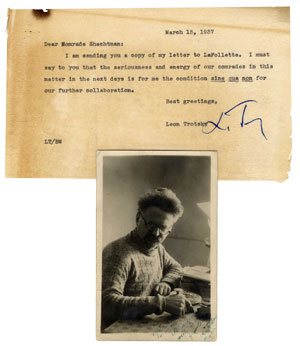 |
Trotsky, Leon. Typed letter signed ("L. Trotsky"), 1 page, 5 x 8¼ in., no place (Mexico), Mar. 15, 1937. Paper toned with edge chips. To Comrade Schachtman, sending him a copy of a letter Trotsky wrote to (Suzanne) LaFollette (who was Secretary of the Commission of Inquiry into the Charges Made against Leon Trotsky in the Moscow Trials). "I must say to you that the seriousness and energy of our comrades in this matter in the next days is for me the condition sine que non for our further collaboration." Together with a postcard photo of Trotsky sitting at a table signed and inscribed in blue-green ink in lower right corner, "To comrade Schachtmann with best friendship. L. Trotsky 26/III 1930." Also, two unsigned 7 x 5 in. photos of Max Schachtmann.
The American Committee for the Defense of Leon Trotsky had been set up following the first of the Moscow "Show Trials" in 1936. Its member were Franz Boas, John Chamberlain, John Dos Passos, Louis Hacker, Sidney Hook, Suzanne La Follette, Reinhold Niebuhr, George Novack, Norman Thomas and Edmund Wilson. John Dewey agreed to head the Commission of Inquiry. From April 10 to April 17, 1937, a sub-committee of the Commission conducted thirteen hearings at Leon Trotsky's home in Coyoacan, Mexico, D.F. Trotsky was defended by the lawyer Albert Goldman, and the Commission found that Trotsky was innocent of all charges made during the Moscow Trials.
Estimated Value $700 - 900.
View details and enlarged photo
| Realized
$4,625 |
Lot 251 |
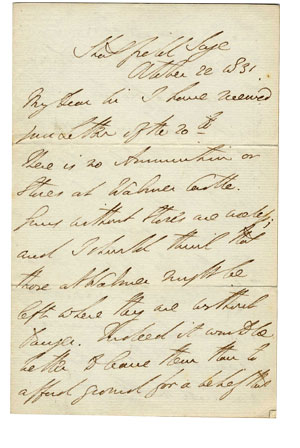 |
Wellesley, Arthur, 1st Duke of Wellington (1769-1852) Anglo-Irish soldier and statesman; one of the leading military and political figures of the 19th century; best known for defeating Napoleon at the Battle of Waterloo (June 18, 1815). Autograph letter signed ("Wellington"), 2¼ pages, 7¼ x 4¾ in., Oct. 22, 1831. Edge splits at three folds. To an unidentified recipient, "I have received your Letter of the 20th. There is no Ammunition…at Walmer Castle…I should think that those at Walmer might be left where they are….Indeed it would be better to leave them than to afford ground for a belief that there is any Alarm. I don't doubt that wherever there is disaffection or the people are for any Reason out of temper I shall feel the Effects thereof. But I can take care of myself; and I hope that this Note will reach you in time to prevent the adoption of any unnecessary Measure of precaution at Walmer Castle."
Wellington became prime minister in 1828, and the highlight of his term was Catholic Emancipation, which granted many civil rights to Catholics in the United Kingdom which had formerly been withheld. His resistance of constitutional reform, however, caused his government to fall in 1830 (he would serve again briefly in 1834). Riots swept the country, and ten days before he wrote this letter, his home at Apsley House was targeted by a mob of demonstrators (as it had been in April), leaving his windows smashed. Walmer Castle was the official residence of the Lord Warden of the Cinque Ports, a ceremonial title held by the Duke of Wellington from 1829-52.
Estimated Value $300 - 400.
View details and enlarged photos
| Realized
$432 |
|
|